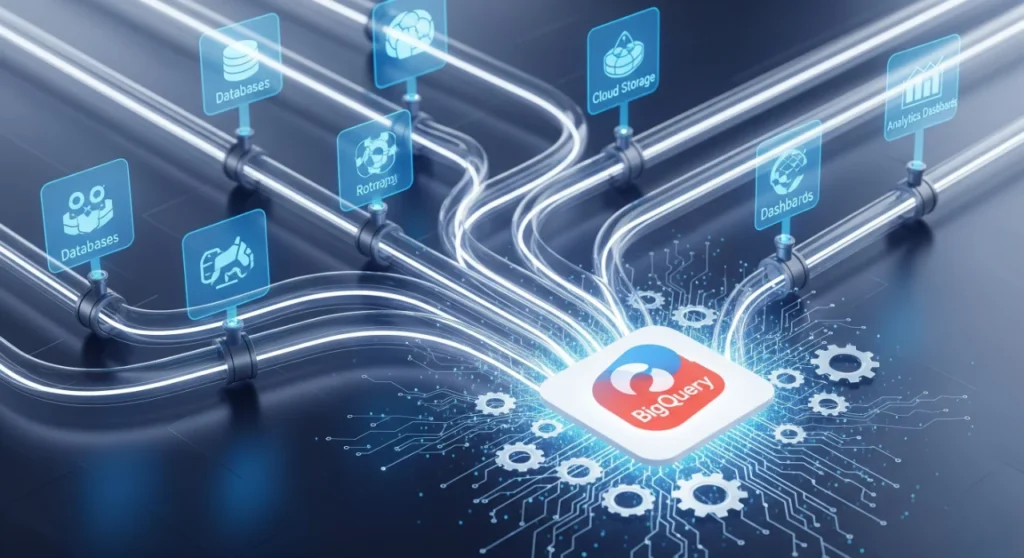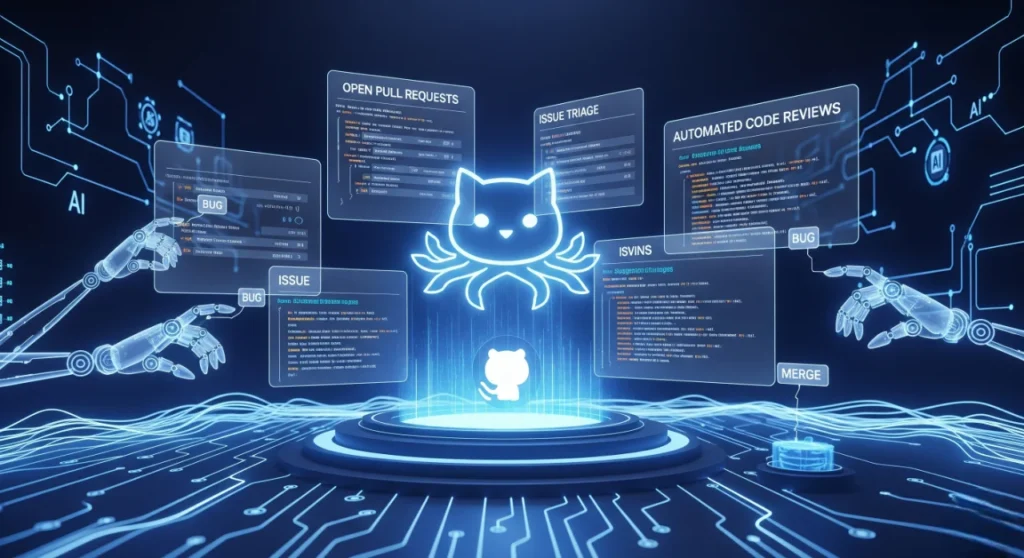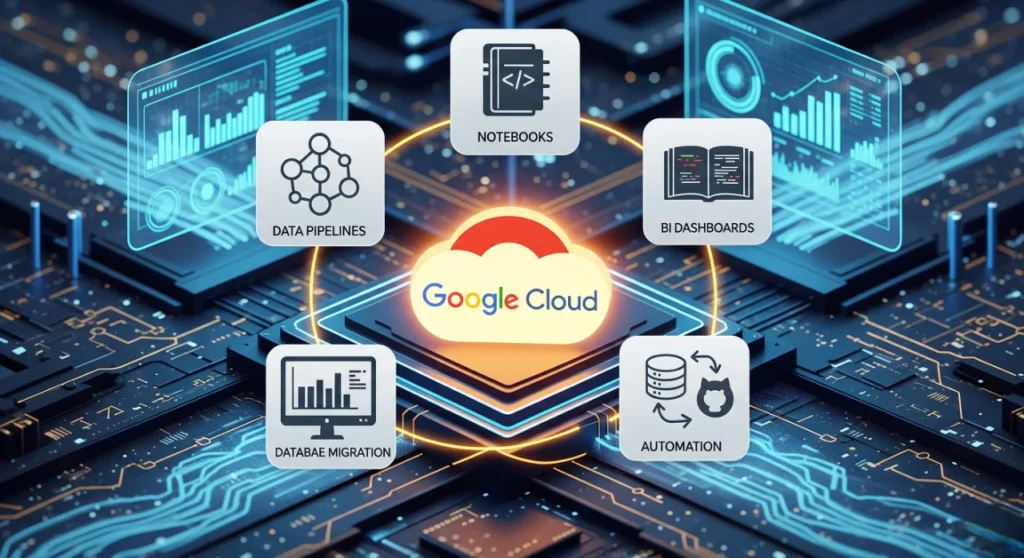Google Cloud has rolled out five powerful AI agents built on Gemini, each designed to tackle everyday developer pain points—data pipelines, analytics, migrations, and GitHub workflows. These tools promise less manual work, faster insights, and more automation across the DevOps stack.
Key Takeaways
- Five specialized AI agents launched by Google Cloud.
- Automates data pipelines, BI, migrations, and GitHub tasks.
- Built on Gemini AI with enterprise-grade security.
- Targeted at developers, analysts, DB admins, and DevOps teams.
- Goal: reduce repetitive coding, boost innovation time.
What are Google Cloud’s new AI agents for developers?
Google Cloud released five AI agents—BigQuery Data Agent, Notebook Agent, Looker Code Assistant, Database Migration Agent, and GitHub Agent. They automate data pipelines, analytics, database migrations, and GitHub workflows, cutting manual effort and speeding development.
Google Pushes AI Into Core Developer Workflows
In a major move to redefine how developers build, manage, and deploy applications, Google Cloud has unveiled five AI-driven agents. The agents—powered by Gemini—aim to cut down repetitive coding, simplify data workflows, and automate routine DevOps tasks.
Instead of wrestling with manual ETL scripts, schema migrations, or GitHub issue triage, developers can now describe tasks in plain English and let AI agents handle the execution. Google is framing this as the next evolution in autonomous developer tooling—where AI doesn’t just suggest code, but actively manages workflows from start to finish.
BigQuery Data Agent: Smarter Data Pipelines
The BigQuery Data Agent transforms how data engineers and analysts create and manage pipelines.
- Natural language commands replace boilerplate SQL.
- AI automates data ingestion, cleansing, and schema evolution.
- It even enforces data quality checks without manual scripts.
Built directly into BigQuery’s Knowledge Engine, it uses Gemini-powered code generation to keep metadata, lineage, and data discovery tightly integrated. For data-heavy teams, this means fewer hours fixing pipelines and more time generating insights.

Notebook Agent: NotebookLM for Enterprise
NotebookLM has already gained attention in consumer AI. Now, Google introduces an enterprise-grade version for BigQuery Notebooks.
With the Notebook Agent, teams can:
- Run exploratory data analysis (EDA) via simple prompts.
- Build and test ML models without manual tuning.
- Generate summaries, FAQs, and even audio recaps of findings.
Unlike its consumer sibling, NotebookLM Enterprise is designed with security, collaboration, and governance at the core. It’s a productivity booster for data scientists and engineers who need speed without compromising enterprise standards.
Looker Code Assistant: Conversational BI
The Looker Code Assistant brings chat-style analytics to Google’s BI platform. Instead of writing queries or LookML code, users can ask:
“Show me quarterly revenue trends by product line.”
In return, the AI produces charts, LookML scripts, or Python snippets. It also suggests follow-up queries and explains its logic, giving non-technical teams confidence in results.
By leveraging Looker’s semantic layer and Gemini AI, this agent makes data-driven decision-making more inclusive—bridging analysts and business leaders.
Database Migration Agent: Gemini-Powered DMS
Database migrations are often dreaded by developers. Google’s new Database Migration Agent aims to make the process nearly painless.
Highlights include:
- AI-powered schema conversion for Oracle, MySQL, and SQL Server.
- Near-zero downtime migrations with continuous replication.
- Explainable migration reports showing before-and-after code.
Running serverlessly, it integrates directly into Google’s Cloud SQL, Spanner, and AlloyDB ecosystem—cutting both risk and overhead.
GitHub Agent: Autonomous Repo Management
Perhaps the most developer-friendly release, the GitHub Agent (Gemini CLI with GitHub Actions) acts like a tireless teammate inside repositories.
- It triages issues, labels bugs, and suggests fixes.
- Reviews pull requests with contextual feedback.
- Responds to prompts like “Write tests for this bug”.
- Fully open-source and customizable for any workflow.
For busy DevOps teams, this is a game-changer—automating chores that usually pile up in sprint backlogs.

Why These Agents Matter
Google’s five new AI agents are more than incremental tools—they represent a shift toward autonomous developer environments.
Instead of spending hours wrestling with data pipelines, notebook prep, dashboard coding, or repo cleanup, engineers can delegate these tasks to AI. This not only reduces fatigue but also frees up cognitive space for innovation—solving business problems, building new features, and accelerating product launches.
From a cloud adoption perspective, the move strengthens Google Cloud’s pitch: AI isn’t just an add-on, it’s now deeply embedded into core DevOps workflows.
Conclusion
With these launches, Google is clearly signaling its strategy: AI should be invisible, embedded, and indispensable in daily developer workflows.
By lowering the barrier to advanced automation, Google Cloud is betting that developers will embrace AI not just as a helper—but as an active collaborator.
The real question now: how quickly will enterprises adopt these agents, and how far will this push the industry toward self-managing software ecosystems?
Source: MarkTechPost
